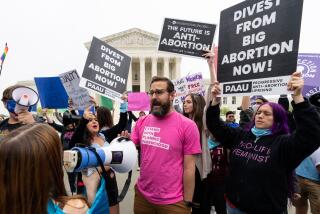Justices Debate Abortion Protest Curb
- Share via
WASHINGTON — The battle over abortion protests on the sidewalks moved indoors to the quiet of the Supreme Court on Wednesday but a lively squabble broke out just the same.
“This is speech on a public sidewalk,” insisted Jay Sekulow, a lawyer representing anti-abortion activists. He argued that face-to-face confrontations between patients and protesters are protected under the 1st Amendment.
But a Clinton administration lawyer said women should not have to endure threats and intimidation to enter an abortion clinic.
The case marked the third time in six years that the court has considered abortion protests, and the justices sounded sharply divided. Though it was free-speech law that was argued, the subject of abortion weighed heavily in the balance.
Colorado lawmakers, faced with a series of clinic protests, passed a law requiring anti-abortion activists to stay eight feet from patients and doctors on the sidewalks outside medical facilities.
“What can’t you tell me from eight feet away?” Justice Stephen G. Breyer, a Clinton appointee, demanded of Sekulow.
He pointed out that protesters are free to hold up signs, to offer leaflets or to urge patients to forgo an abortion. “What exactly is the problem?” he asked.
But Justice Antonin Scalia, a Reagan appointee and a fierce foe of abortion, said that the sidewalk counselors want to speak quietly with pregnant women and urge them to reconsider their plans. The eight-foot buffer zone prevents them from accomplishing their mission.
“I don’t normally stand eight feet away when I speak to someone,” Scalia said.
“But you have willing listeners,” replied a Colorado state lawyer defending the law.
“Don’t be too sure!” interjected Justice Sandra Day O’Connor, who has had several spats with the irrepressible Scalia.
The Colorado case appeared to split the court along liberal and conservative lines. And, as has become common, conservatives championed the free-speech claim while liberals defended the need to preserve peace and order on the sidewalks.
Justice Anthony M. Kennedy, another Reagan appointee, faulted the state for imposing “speech regulatory zones.”
“That’s what this is,” he said. “It forecloses all debate on this topic.”
But there is a long tradition of “quiet zones” around hospitals and schools, responded Justice Ruth Bader Ginsburg, a Clinton appointee. Hospital patients are usually not interested in loud and lively debates, she said.
In past rulings in cases from Florida and Buffalo, N.Y., the justices upheld injunctions that barred protesters from blocking entrances to abortion clinics.
However, they have refused to shield patients and doctors generally, including from protests near their homes or when they are traveling to and from clinics.
The Colorado case differs because it is a law, not a judge’s order. And it sets the eight-foot buffer zone around patients, but only when they are within 100 feet of the entrance to a medical facility.
If the high court were to uphold the state law in the case (Hill vs. Colorado, 98-1856), other cities and states would be expected to adopt similar measures.
Meanwhile, in rulings issued Wednesday, the court:
* Upheld on a 5-4 vote the death sentence for the murderer of a Virginia state trooper, even though jurors may have been confused during the sentencing hearing (Weeks vs. Angelone, 99-5746).
The instructions read to the jury said that they “may” impose a death sentence if they unanimously agreed that the crime was “wantonly vile, horrible and inhumane.”
During the deliberations, jury members asked a question suggesting that they were not sure they could opt for mercy and impose a life sentence. Rather than answer “yes,” the judge read the instructions that said they “may” impose a death sentence.
Although not ideal, the judge’s handling of the matter was adequate, said Chief Justice William H. Rehnquist. Lonnie Weeks Jr. had shot a Virginia state trooper but was remorseful before the jury. Nonetheless, it voted to give him a death sentence.
* Upheld on a 5-4 vote a long-standing California rule that allows appointed defense lawyers the option of not filing a full brief if they believe that their client’s claims are frivolous (Smith vs. Robbins, 98-1037).
The U.S. 9th Circuit Court of Appeals and the four dissenters said that because it is an adversarial system, defense lawyers should be required to file a brief making arguments on their clients’ behalf. But again, the majority said that the state’s procedure is adequate and therefore constitutional.
More to Read
Get the L.A. Times Politics newsletter
Deeply reported insights into legislation, politics and policy from Sacramento, Washington and beyond. In your inbox twice per week.
You may occasionally receive promotional content from the Los Angeles Times.











